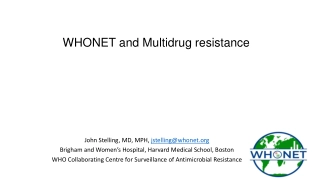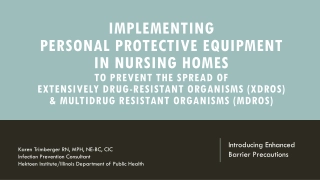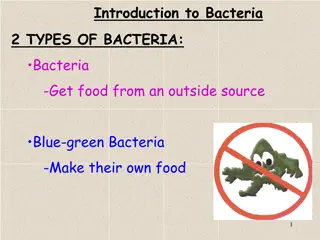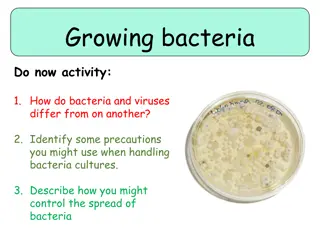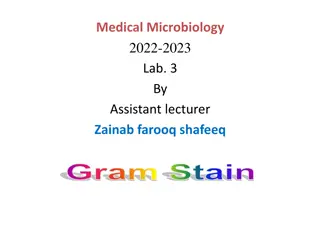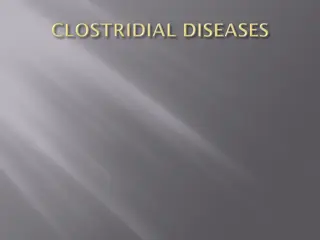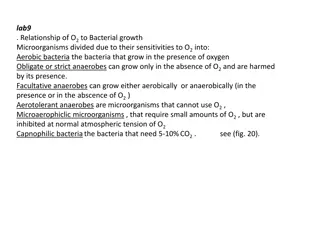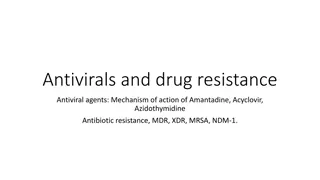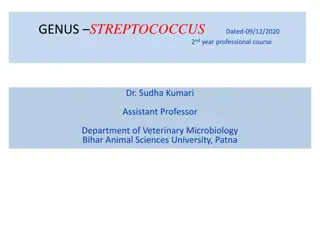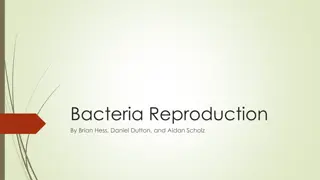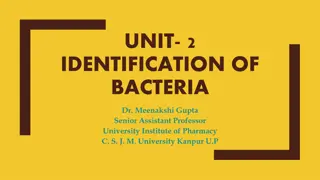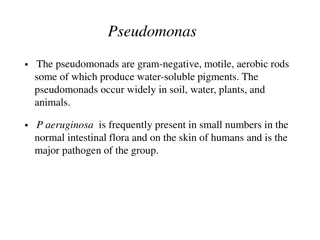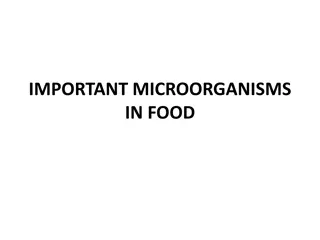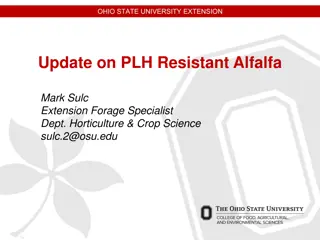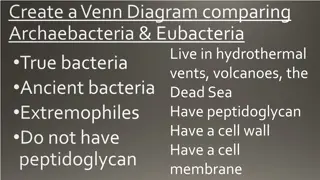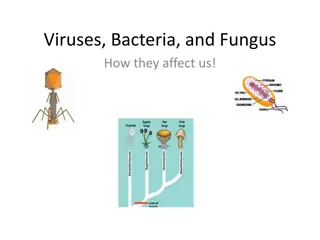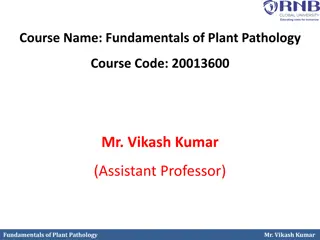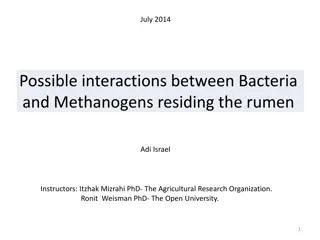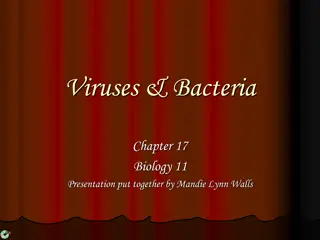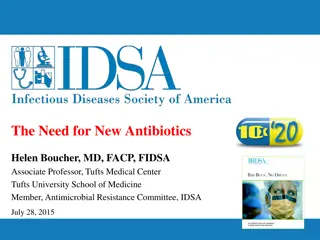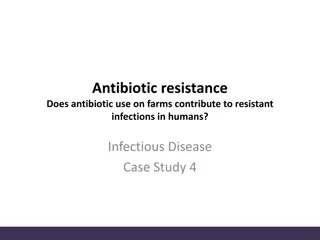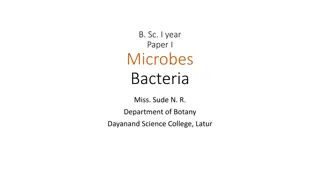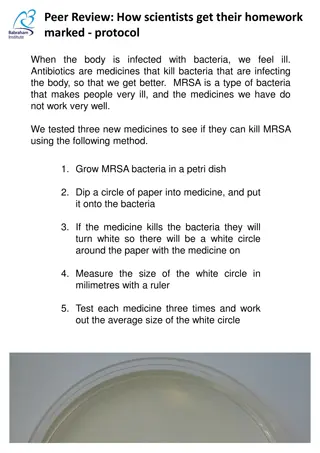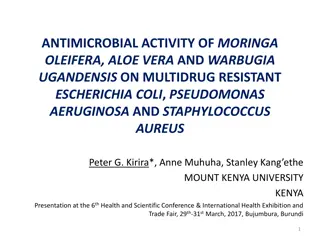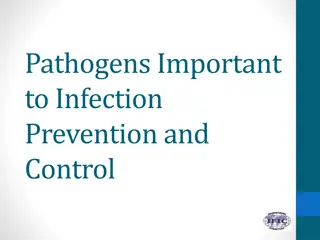Infection Control, Sterilization & Decontamination Event |21st - 22nd March 2024
MarketsandMarkets is pleased to announce its 8th Annual Infection Control, Sterilisation, and Decontamination in Healthcare Conference, which will take place March 21\u201322, 2024, in London, UK. \n\nEnquire Now @ https:\/\/events.marketsandmarkets.com\/infection-control-sterilization-and-decontami
2 views • 5 slides
Wales in a global context: enhancing learners’ skills
World of bacteria through the lens of mathematics and science. This educational material delves into the characteristics, importance, and impact of bacteria on the environment and human health. From their small single-celled structures to their role in ecosystems, learn about the significance of bac
0 views • 10 slides
Understanding Multidrug Resistance in Bacterial Infections
Multidrug resistance refers to organisms resistant to multiple antibiotics, impacting therapy decisions, increasing morbidity and mortality, and raising healthcare costs. Monitoring resistance profiles can aid in tracking outbreaks, with molecular typing confirming issues. Join the WHONET Webinar Se
0 views • 35 slides
Implementing Personal Protective Equipment in Nursing Homes for Preventing XDROs and MDROs
Learn from infection prevention consultant Karen Trimberger about implementing enhanced barrier precautions in nursing homes to prevent the spread of extensively drug-resistant organisms (XDROs) and multidrug-resistant organisms (MDROs). Explore the difference between colonization and clinical infec
6 views • 33 slides
Exploring the Fascinating World of Bacteria: Types, Shapes, and Structures
Delve into the diverse characteristics of bacteria, from their food sources to shapes and major cell structures. Discover how bacteria play a crucial role in various environments, from soil to the human body.
0 views • 39 slides
Understanding Bacteria Cultures and Growth: Key Concepts and Practical Tips
Scientists culture bacteria to study them effectively. Differentiating between bacteria and viruses, maintaining precautions when handling bacteria cultures, and controlling their spread are vital. Tasks like watching relevant videos, self-assessments, steps for growing useful microorganisms provide
0 views • 17 slides
Addressing The Quantum Threat: The Quantum Resistant Ledger
The Quantum Resistant Ledger (QRL) is a visionary blockchain and digital asset security solution designed to counter the emerging threat of quantum computing. With quantum technology advancing and traditional blockchains at risk, QRL offers an industrial-grade, quantum computer-resistant cryptocurre
2 views • 9 slides
Understanding the Gram Stain Technique in Medical Microbiology Lab
The Gram stain is a crucial technique in bacteriology, dividing bacteria into Gram-positive and Gram-negative groups based on cell wall characteristics. This method involves using crystal violet, iodine, ethanol, and safranin to differentiate between the two types of bacteria. Gram-positive bacteria
0 views • 11 slides
Overview of Clostridial Diseases Caused by Clostridium Bacteria
Clostridial diseases are caused by bacteria of the genus Clostridium, which are anaerobes commonly found in soil, feces, and healthy animal tissues. These bacteria can lead to various diseases in animals such as black quarter, gas gangrene, necrotic dermatitis, and more. Understanding the different
0 views • 55 slides
Understanding Anaerobic Bacterial Growth and Culturing Methods
Anaerobic bacteria have specific sensitivities to oxygen, with categories such as aerobic, obligate anaerobes, facultative anaerobes, aerotolerant anaerobes, microaerophiles, and capnophilic bacteria. Methods like Anaerobic Jar and GasPak system are used for cultivating anaerobic bacteria, ensuring
0 views • 7 slides
Understanding Antivirals and Drug Resistance in Microbiology
Antiviral agents like Amantadine, Acyclovir, and Azidothymidine, as well as antibiotics, play a crucial role in combating drug resistance. The emergence of multidrug-resistant pathogens, such as MRSA, NDM-1, and XDR strains, presents challenges in treatment. Various drug categories from first-line t
1 views • 13 slides
Overview of Streptococcus Bacteria and Classification
Streptococcus is a genus of gram-positive bacteria commonly found on skin and mucous membranes. It includes pathogenic and non-pathogenic species, with cell division along a single axis forming pairs or chains. The bacteria were first observed by Billroth and named by Ogston. Different types of stre
0 views • 28 slides
Understanding the Spoilage Flora in Raw Meat Products
Raw meat products are highly perishable due to the presence of various spoilage bacteria, yeasts, and molds. Factors such as nutrient availability, oxygen levels, storage temperature, and pH influence the predominant spoilage flora in meat. Psychrotrophic bacteria thrive in refrigerated storage, lea
0 views • 17 slides
Insights into Bacteria Reproduction and Cell Division
Explore the fascinating world of bacteria reproduction through binary fission, conjugation, and mitosis. Uncover the similarities and unique aspects of prokaryotic and eukaryotic cell division processes. Learn how conjugation plays a vital role in transferring genetic information between bacteria ce
0 views • 21 slides
Trickling Filter: A Sustainable Wastewater Treatment Solution
The trickling filter is a biological treatment process utilizing a solid media where bacteria accumulate to maintain high populations. Bacteria growth occurs on the media surface with oxygen provided by air diffusion. As bacteria metabolize waste, they reproduce, creating a biological layer. Filter
5 views • 26 slides
Understanding Bacterial Cell Structure and Function
Bacteria display unique cellular structures and functions that differ from eukaryotic cells. They have a simple structure with a plasma membrane but lack complex internal membrane systems. The cytoplasm contains inclusion bodies, ribosomes, and genetic material in the nucleoid. Bacteria can be categ
4 views • 21 slides
Bacteria Identification Techniques: Staining and Microscopy Overview
Staining techniques in microbiology play a crucial role in visualizing bacteria under microscopes. This content covers the importance of staining, types of dyes, wet and dry mounts, hanging drop technique, and different types of staining methods employed in identifying bacteria. Explore the basics o
0 views • 39 slides
Understanding Pseudomonas and Proteus Bacteria
Pseudomonas is a group of gram-negative, motile, and aerobic bacteria found in various environments, with Pseudomonas aeruginosa being a significant pathogen in humans. It can produce distinctive pigments and is resistant to many antimicrobial agents. Lab diagnosis involves culture testing on specif
0 views • 17 slides
Important Bacterial Groups in Food
Bacteria play a crucial role in food, with various groups such as Lactic Acid Bacteria, Acetic Acid Bacteria, Propionic Acid Bacteria, Butyric Acid Bacteria, Proteolytic Bacteria, Lipolytic Bacteria, Saccharolytic Bacteria, and Pectinolytic Bacteria identified for their specific roles in food fermen
0 views • 17 slides
Advancements in Potato Leafhopper-Resistant Alfalfa Cultivars
Potato leafhopper-resistant alfalfa cultivars have shown significant improvement in resistance levels, reducing the need for insecticides and enhancing agronomic performance. Introduced in 1997, these cultivars, such as PIONEER 5454, DK 131 HG, and EVERGREEN, have demonstrated enhanced yield and res
0 views • 14 slides
Comparison of Archaebacteria & Eubacteria Venn Diagram
Archaebacteria and Eubacteria are two types of bacteria with distinct characteristics. Archaebacteria are ancient bacteria that are extremophiles, living in harsh environments like hydrothermal vents and volcanoes, lacking peptidoglycan. On the other hand, Eubacteria are true bacteria with peptidogl
0 views • 60 slides
Understanding How Viruses, Bacteria, and Fungi Impact Human Health
Explore the intricate world of viruses, bacteria, and fungi and how they interact with living organisms. Learn about the structure and functions of viruses, the role of bacteria in diseases, and the implications of fungi on human health. Discover the different ways these microorganisms affect us and
0 views • 37 slides
Understanding Plant Pathology: Reproduction and Classification of Bacteria
This course on Fundamentals of Plant Pathology, led by Mr. Vikash Kumar, covers essential topics such as disease identification, pathogen nature, disease management strategies, pathogen classification, and plant disease diagnosis. It delves into the reproduction and classification of plant pathogeni
0 views • 16 slides
Interactions Between Bacteria and Methanogens in the Rumen
The rumen, an anaerobic fermentation chamber in ruminant animals, houses a diverse microbial community including bacteria, fungi, protozoa, methanogenic archaea, and phages. Methanogens play a crucial role in methane production using fermentation end products. Research aims to explore evidence of in
0 views • 21 slides
Understanding Viruses and Bacteria: A Biology Presentation by Mandie Lynn Walls
Explore the world of viruses and bacteria through this engaging biology presentation put together by Mandie Lynn Walls. Learn about the structure of viruses, different types of viruses like T4 Bacteriophage and Herpes Virus, the distinction between viruses and bacteria such as E. coli, vaccination m
0 views • 39 slides
Understanding Modern Non-inferiority Trial Designs in Antibiotic Development
This article discusses the significance of non-inferiority designs in advancing antibiotic development to combat multidrug-resistant bacteria. It emphasizes the importance of distinguishing between UDR, MDR, and XDR bacterial categories in trial design, highlighting challenges in selecting comparato
0 views • 12 slides
Challenges in Conducting Interventional Trials for Antibacterial Resistance
Addressing antibacterial resistance through interventional trials presents challenges relating to nomenclature, trial design implications, and the continuous evolution of resistant bacteria categories. The discussion emphasizes the need for a sustained pipeline of novel therapies to combat resistanc
0 views • 39 slides
The Urgent Need for Developing New Antibiotics
Antibiotic resistance has led to devastating consequences, with lives lost and individuals suffering from resistant infections. This urgency is highlighted through real-life cases of individuals facing complications due to antibiotic-resistant bacteria. The narrative follows a 46-year-old man with e
0 views • 19 slides
Antibiotic Stewardship Awareness Event at University of Pittsburgh
Annual Get Smart Week event at University of Pittsburgh focusing on antibiotic stewardship to raise awareness about the problem of antibiotic resistance. The event featured Dr. Karen Hacker from the Allegheny County Health Department and highlighted the importance of proper antibiotic use to combat
0 views • 6 slides
Antibiotic Resistance in Humans: Impact of Antibiotic Use on Farms
Antibiotic resistance is a growing concern, with evidence suggesting a link between antibiotic use in farm animals and resistant infections in humans. Explore a case study of a Salmonella outbreak in Denmark, where antibiotic treatment failed, leading to fatalities. Learn about the role of selection
0 views • 25 slides
Understanding the Role of Gut Bacteria in Obesity and Metabolic Disease
Trillions of bacteria in our gut play a crucial role in obesity and metabolic diseases. By analyzing studies on antibiotic effects, bacterial composition, and diet impact, we learn how gut bacteria influence weight gain, energy use, and overall health. Research shows diverse bacterial types affect w
0 views • 16 slides
Advantages of Infection Preventionists in Antimicrobial Stewardship
In this collection of images and text, the importance of infection preventionists taking on the role of antimicrobial stewards is highlighted. The content discusses their unique advantages, strategies, and goals in reducing multidrug-resistant organisms and improving patient outcomes through steward
0 views • 20 slides
Foundations of Cryptography: Digital Signatures and Collision-Resistant Hash Functions
Foundations of Cryptography explores the construction of digital signature schemes and collision-resistant hash function families using one-way functions and safe primes. The content delves into the concept of collision-resistant hash functions and their construction from the discrete logarithm prob
0 views • 31 slides
Understanding Bacteriophages and Antibiotic Resistant Bacteria
Explore the relationship between bacteriophages and bacteria, the survival advantage of polyvalency, and the impact of unfavorable conditions on species survival. Discover how manipulation of experiment variables helps establish resistance thresholds and how compounded negative effects affect specie
0 views • 9 slides
Managing MDR Gram-negative Enterobacteriaceae Outbreaks in Hospitals: Response Strategies and Best Practices
Hospitals face a growing threat from multidrug-resistant Gram-negative bacteria, such as Acinetobacter baumannii and Klebsiella pneumoniae. This article discusses the emergence of carbapenem-resistant Enterobacteriaceae in Europe and outlines response strategies, including lab screening, communicati
0 views • 23 slides
Rising to the Challenge of Multidrug-Resistant Gram-Negative Bacteria
The presentation discusses the alarming rise of multidrug-resistant Gram-negative bacteria, highlighting the threat they pose to public health and the economy. Notable figures like Dr. Tom Frieden and Dame Sally Davies emphasize the urgency of taking action to prevent a potential return to a pre-ant
0 views • 58 slides
Detailed Overview of Bacteria's Structure and Function
Explore the world of bacteria with a focus on their microscopic nature, general characteristics, ultrastructure of bacterial cells, and components like cell envelope, cytoplasm, and nuclear material. Uncover the diverse forms of bacteria, their mode of nutrition, reproduction methods, and unique fea
0 views • 12 slides
Peer Review: Testing New Medicines on MRSA Bacteria
Scientists conducted an experiment to test three new medicines on MRSA bacteria to determine their effectiveness. By measuring the size of white circles around paper discs containing the medicines, they were able to compare and analyze the results. The study aims to find potential treatments for MRS
0 views • 7 slides
Antimicrobial Activity of Moringa Oleifera, Aloe Vera on Multidrug-Resistant Bacteria
Antibiotic resistance poses a significant global health threat, leading to increased mortality and morbidity. This study investigates the antimicrobial properties of Moringa Oleifera, Aloe Vera, and Warbugia Ugandensis on multidrug-resistant Escherichia coli, Pseudomonas aeruginosa, and Staphylococc
0 views • 17 slides
Understanding Special Pathogens for Infection Prevention and Control
Pathogens such as Mycobacterium tuberculosis, Clostridium difficile, and antibiotic-resistant organisms like MRSA and VRE pose significant challenges to infection prevention programs. This content discusses the impact of these pathogens, transmission of tuberculosis, and clinical forms of TB. Antibi
0 views • 51 slides


